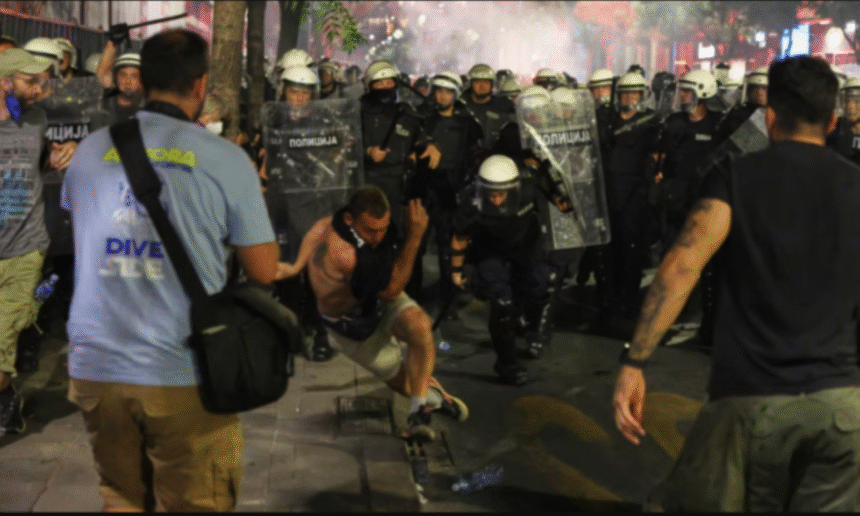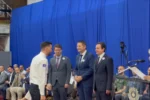In recent months, police cordons have been separating supporters and opponents of the ruling government in several Serbian cities. Clashes have escalated from throwing water and eggs to verbal insults and physical violence.
The latest incident occurred on August 10 in Vrbas, where police intervened to separate supporters of the ruling Serbian Progressive Party (SNS) and their opponents, who exchanged insults, plastic bottles, and eggs.
Incidents Fuel Ethnic Tensions and Accusations of Polarization
An incident that garnered significant public attention took place on August 9 in Bački Petrovac, a town with a large ethnic Slovak population. A group of men verbally attacked and tore up photographs from an exhibition organized by Slovak citizens that documented student-led protests. The incident occurred after police cordons, which had been separating the groups, were withdrawn.
Petar Holik, an assembly member for the opposition “Bravo! Novi Sad” movement, told Radio Free Europe that this incident “extremely disturbed the ethnic Slovak community” and a place that had been peaceful until now. Holik accused the SNS of using its power for years to polarize society, claiming it has now extended this method to ethnic communities, creating “suitable” and “unsuitable” Slovaks, Russians, Hungarians, and Croats.
A similar pattern of division has been observed elsewhere. In late July, masked men in Novi Pazar, a Bosniak-majority city, violently removed students who were blocking the state university. Following this, pro-government media and officials made derogatory remarks about the Bosniak population, which led to a criminal complaint being filed against the Speaker of the Assembly, Ana Brnabić, for allegedly inciting national, racial, and religious hatred.
On August 10 in Novi Sad, hundreds of young people painted the Serbian tricolor flag on building facades, leading to physical clashes and police arrests when residents tried to paint over them. The Ministry of Internal Affairs has not responded to inquiries about these incidents or the police’s actions.
Political Analysts See a “Demonstration of Force”
Dejan Bursać, a research associate at the Institute for Philosophy and Social Theory, sees these events as a “demonstration of force” by the ruling party. He suggests that the SNS is trying to portray the protesters as anti-Serbian to sway undecided voters and to create divisions within the protest movement itself, which includes both liberal and conservative members.
Bursać believes that these recent developments, combined with new economic measures and election polls, suggest the ruling party may be considering holding early elections. President Aleksandar Vučić has already stated that parliamentary elections will be called “before the constitutional and legal deadline.”
The call for early parliamentary elections was initially made by students who have been blocking faculties for nine months, demanding accountability for a canopy collapse in Novi Sad that killed 16 people.






